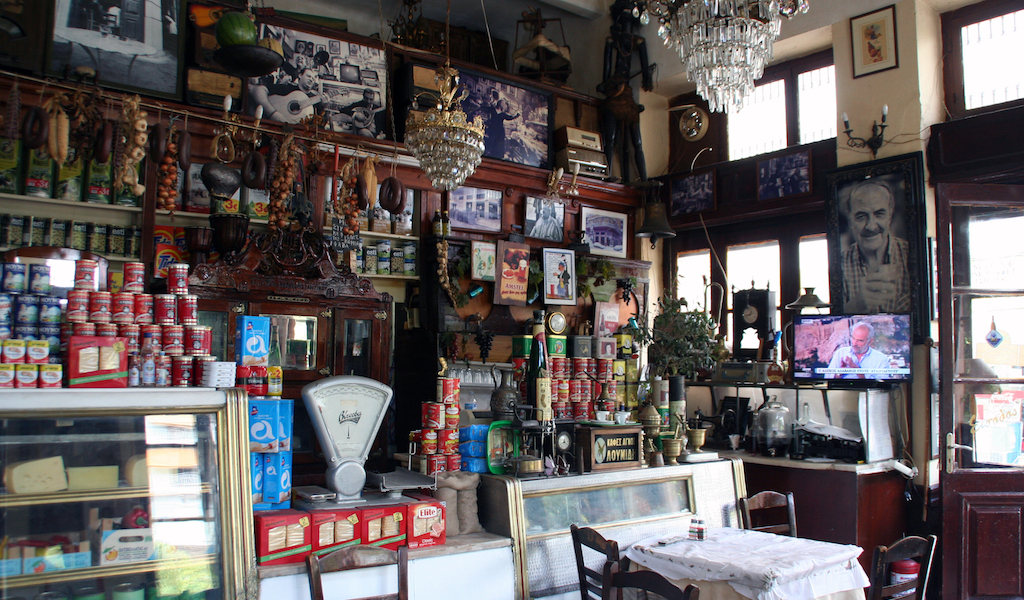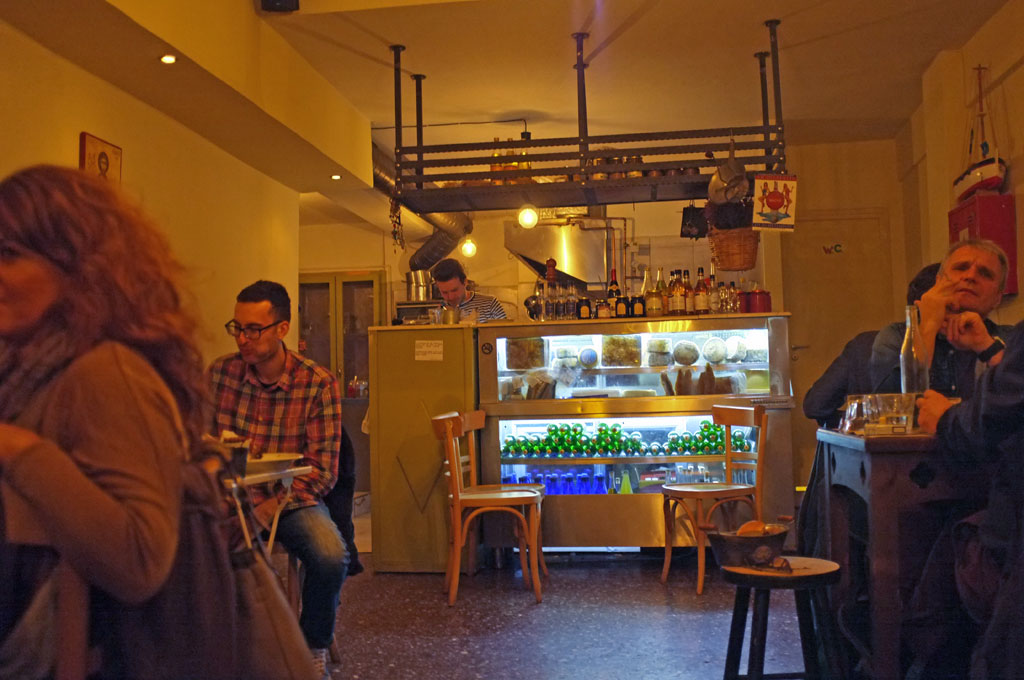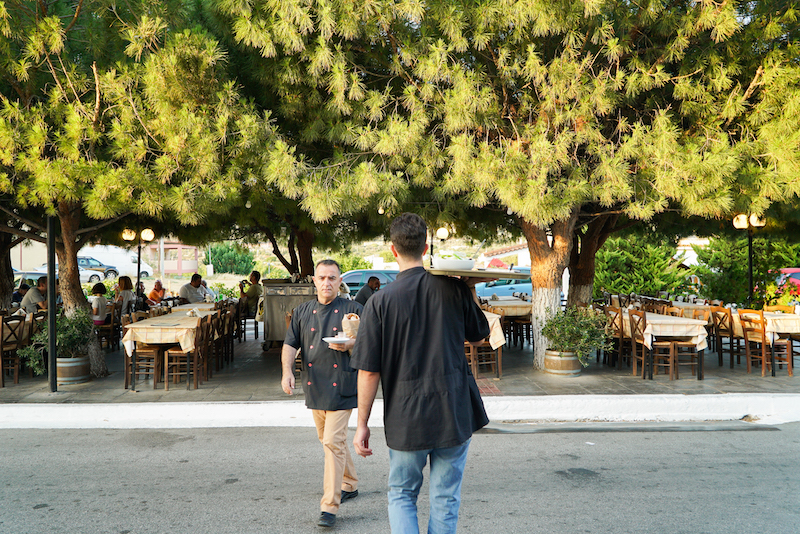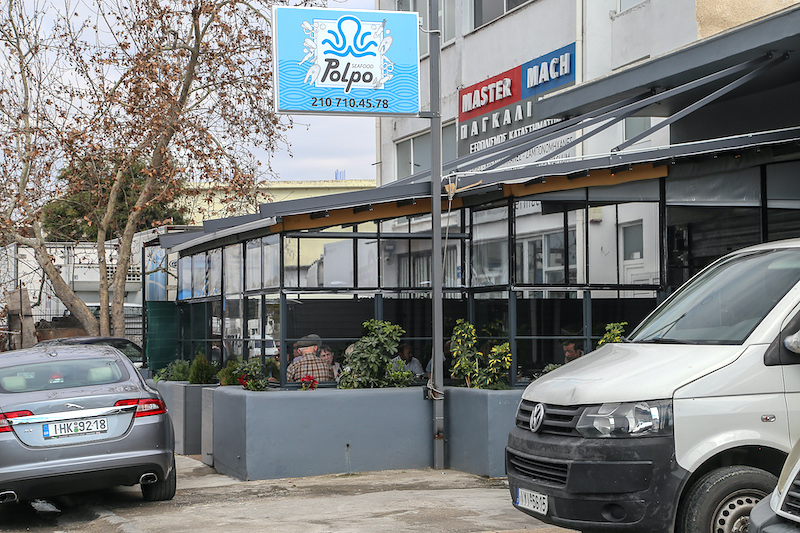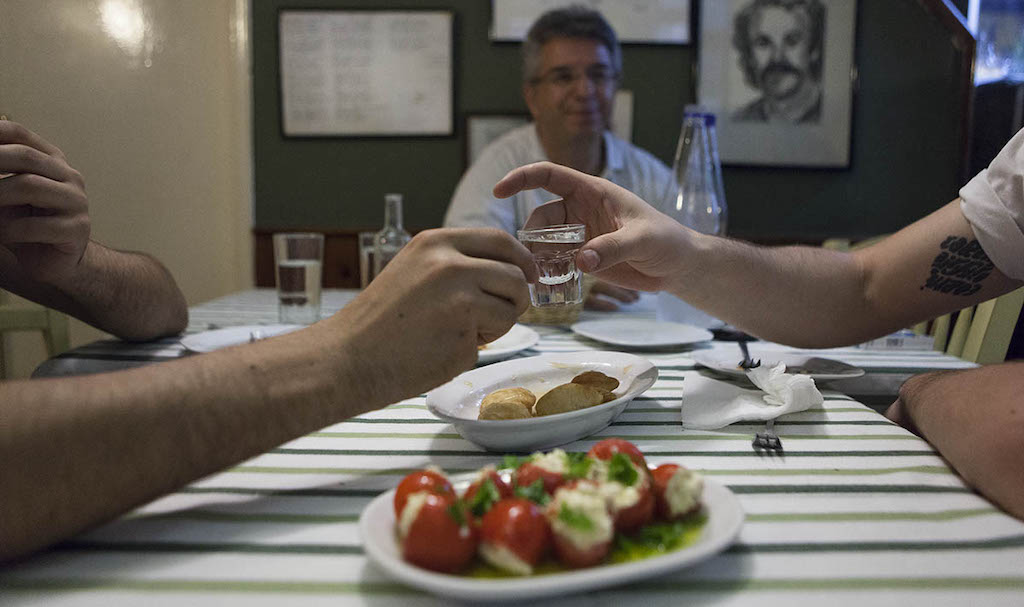We can't find the internet
Attempting to reconnect
Something went wrong!
Hang in there while we get back on track
Athens
Athens's culinary record
While for the last decade Athens has been struggling with the impact of the ongoing economic crisis, which has also brought up some big questions regarding Greece’s self-identity and the country’s place within Europe, the hard times have also helped spark a process of rediscovery, with Greeks taking a new look at their own identity, their own resources and – most importantly – their own culinary traditions and heritage.
Get the Full Story →Tour Athens with Culinary Backstreets®
Upcoming Athens Food Tours
discover the city, street by street, bite by bite
Explore Athens
Athens
Diporto: Time Travel Taverna
In business since 1887, Diporto – a defiantly traditional spot in downtown Athens – has no sign and no menu. The staff doesn’t speak a word of English, and you might have to share a table with eccentric old men who look like they stepped out of a folk ballad. You will probably have to mime your order or draw it on the paper tablecloth. But if you ever wondered what it would be like to eat in a working-class Greek taverna circa 1950, read on. Diporto is located smack in the middle of what is – at least by day – one of the Athens’ most fascinating areas, home to a variety of specialized marketplaces. Varvakeios, one of the few of its kind in Europe, is the city’s largest fish and meat market, in operation since 1886. Around this enormous, chaotic market, where vendors try to outdo each other in shouting, lies Athens’ traditional center of trade, with streets devoted to specific merchandise: hardware stores and bric-a-brac on Athinas Street; spices, cheeses, kitchen equipment and plants on Evripidou and Sofokleous; doorknobs on Vissis (yes, there is a street dedicated solely to doorknobs).
Read moreAthens
Meet the Vendors: Christos Mplantis, the Strawberry Man of Athens
Christos Mplantis, a 37-year-old farmer based in Marathon, a region in northeastern Attica, has farming in his blood. His father, Alexandros, was a farmer too, and starting at the age of ten, Christos began joining his father at farmer’s markets, or laiki (λαϊκή), around Athens any time he was off school, particularly during the summers. Although working the land and selling at markets became second nature to him, Christos didn’t immediately think to follow in his father’s steps. He went to technical school to become certified as a plumber but couldn’t find a decent job after graduating. So, around 17 years ago, he found himself in a familiar spot: working next to his father.
Read moreAthens
Retsina: The Fall and Rise of a Misunderstood Greek Classic
Retsina has a bad rap. Many locals and foreigners associate this Greek classic with cheap “house wine” served at tavernas – you know, the stuff that is bright yellow in color, has an intensely resinous flavor and practically guarantees a headache the next morning. But we think retsina is just misunderstood. Increased demand in the 1960s for this resin-infused wine led to a plunge in quality, sullying its good name. Yet a new generation of Greek winemakers and sommeliers has worked tirelessly over the last decade and a half to restore retsina’s standing in the international world of wine, experimenting with different grape varietals and methods of fermentation in the process.
Read moreAthens
To Eidikon: Extra Special
At the corner of Psaron and Salaminos streets, in a quiet neighborhood of Piraeus, there’s a place that looks straight out of a 1960s Greek black-and-white movie. Its name, eidikon, means “special,” and it’s the last of its kind: a bakalotaverna, or grocery store and eatery, all in one. The shop opened in 1920, when the three Papakonstantinou brothers from Gardiki, an impoverished village near Trikala in central Greece, came to Athens in search of better prospects. The building was the tallest in the area. It had large windows, and in good weather, one could even see the sea on the horizon.
Read moreAthens
CB on the Road: Along Thessaloniki’s Oregano Trail
As the car crested a craggy hill, the first rays of golden sun peaked over the horizon, painting distant clouds the color of red wine. Tufts of gnarled olive trees and rows of grapes whizzed by the window as we approached the farm, outrunning the quickly approaching sun. We left Thessaloniki at 5:30 a.m. to beat the Greek summer’s heat, something of concern for both workers – and oregano plants, our destination’s star crop. Michalis and Anastasia, owners of Aetheleon, were prepared for the day’s harvest. With every rising degree, minuscule droplets of moisture and essential oils seep from the oregano in an attempt to cool them down. The plants’ sweat-like response can be easily smelled, the aromatic wafts upon the breeze a prelude to the frenzied buzzing of hordes of happy bees following the fragrant trail.
Read moreAthens
Peinirli Ionias: Talking Dough
Since its name derives from the Turkish word peynir (cheese), it’s no surprise that Athens’ best peinirli (πεϊνιρλί, “with cheese”), a boat-shaped flatbread similar to pide in Turkey and khachapuri in Georgia, is usually found at old, specialized shops or eateries owned by families who originally came from Asia Minor or Pontus, the Greek name for the southern coast of the Black Sea, in the early 20th century. So when Spyros, the owner of Peinirli Ionias in Ambelokipoi, one of the most popular peinirli takeaways in downtown Athens, casually mentions that he originally hails from the Ionian island of Corfu – nowhere near Asia Minor, another name for Turkey’s Anatolia region – we are left scratching our heads. Sensing our confusion, he quickly adds that he learned the art of peinirli-making directly from the source, so to speak: his father- and mother-in-law, who both emigrated to Athens as part of the 1923 population exchange between Greece and Turkey.
Read moreAthens
Panegyria: Greek Raves for the Whole Family
The warm months in Greece have special meaning for most villages, particularly on the islands, as they herald the legendary panegyria. Organized by locals, these communal festivals are usually held outdoors, often in the village’s central square. They provide an opportunity for people of all ages, from young children up to elderly folks, to feast, drink and dance until the early morning hours – it’s a chance for the whole family to let loose. Considering that this tradition involves entertainment, food, booze and dancing, it’s no surprise that its observance is centuries old. The word panegyri (πανηγύρι) derives from the ancient Greek word panegyris (πανήγυρις, pan = all + agiris = meeting), whose use has been documented as early as the 7th century BC.
Read moreAthens
CB on the Road: The Unbeatable Mezedopoleia of Thessaloniki
One of the most popular kinds of restaurants in Greece is the mezedopoleio, which, as the name indicates, specializes in traditional local meze dishes (washed down with generous amounts of ouzo or other alcoholic drinks). Back in the day, mezedopoleia were the neighborhood’s meeting points. Men gathered there most of the day to drink, have a bite, talk politics and play backgammon, chess or cards. Today, the mezedopoleio remains a simple and very affordable place to eat, sometimes operating as a kafenio (cafeteria), and often offering traditional live music to add to the experience. Among Greek cities Thessaloniki is particularly famous for its numerous and excellent mezedopoleia, which makes it very difficult to choose just a few.
Read moreAthens
CB on the Road: Spata's Breakfast of the Saints
Spata (pop. 10,000) lies just 20 km east of Athens and is probably best known as the location of Athens International Airport. But the town is more than just a gateway into and out of the region – especially at the end of June. That’s when Spata hosts a festival to honor St. Peter and St. Paul, the official protectors of the city. The highlight of the festival comes at the end of the last day, June 30, with a glorious communal meal: Enormous quantities of braised beef that have been cooked for 12 hours over a wood fire are served to all the citizens of Spata and visitors to the town.
Read moreAthens
New Wave Retsina: A Maligned Wine's Comeback
For too long retsina has been thought of as a cheap, oxidized, overly pungent bad wine made from mediocre grapes, its poor quality disguised by an overdose of resin and exacerbated by being stored in questionable conditions in the backyards of seaside tavernas. To say the wine has an image problem is an understatement – but that may be changing. Regardless of its reputation, retsina is a true Greek original. It dates back to the Ancient Greeks, who would coat the interiors of their otherwise porous earthenware amphorae with resin to make their wine storage airtight. Wine drinkers grew to like the taste, and winemakers consequently began adding pine resin to grape must during fermentation.
Read moreAthens
Greek Easter Week, Dish by Dish
Forget about Christmas. In Greece, Easter is the main event, one where food, naturally, plays a starring role. It is also very much a holiday celebrated in the countryside: most Athenians go back to their villages during the holiday to be with their extended family and enjoy the Easter-related culinary delights of their home region.
Read moreAthens
Athens’ New-School Wine Bars
The economic crisis that has plagued Greece for the past five years has led to changes on the Athenian culinary scene, including the opening of three new types of venues that seem to be reflective of the times. The first two – cupcake places and frozen yogurt shops – are imports from abroad, perhaps indicative of a population in need of something sweet, comforting and affordable. On the other hand, the third trend, wine bars, digs deep into Greece’s roots, representing a fascinating phenomenon in a country that is one of the world’s oldest wine-producing regions. In antiquity Greek wine was exported across the Mediterranean, and the winemaking tradition has remained strong through the millennia. Yet although there are numerous wineries around the country, in the modern era Greek wine has never achieved the place it deserves on the international market. Production levels are low and vintners have long been unsure of how to market abroad.
Read moreDaily Dispatches from the Frontlines of Athens
Latest Stories: Athens
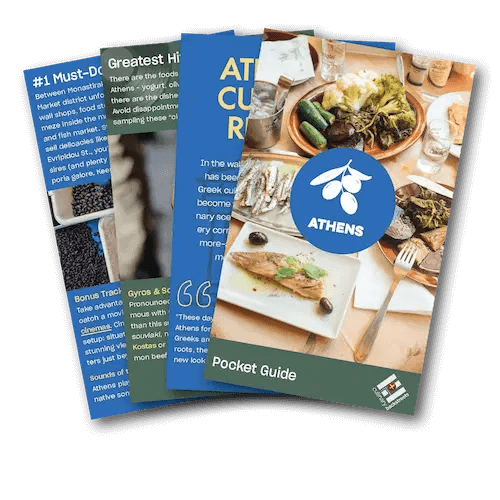
Get Your Free Athens Pocket Guide
Introducing our pocket-sized Athens guide — perfect for your next culinary adventure. Yours free when you sign up for our newsletter.
Get Your Free Athens Pocket Guide
Introducing our pocket-sized Athens guide — perfect for your next culinary adventure. Yours free when you sign up for our newsletter.
Immersive Multi-Day Journeys In and Around the World’s Culinary Capitals
Upcoming trips beyond Athens
Visual Dispatches from the Frontlines of Local Eating
Athens Videos

Discover Athens With Culinary Backstreets®

CB Cooks: Carolina Doriti Makes Galatopita, a Greek Milk Pie

A Sweet Greek Tradition

Kozani Saffron, the Greek Spice of Myth

Culinary Backstreets Visits: A Traditional Cheesemaker on Amorgos

Distilling Tsipouro

Making Pasteli in Amorgos

Πρεμιέρα CineDoc 2014 2015

CB Cooks: Carolina Doriti Makes Dolmades Avgolemono

Discover Athens With Culinary Backstreets®
Culinary Backstreets® Envoys, Always Searching for the Next Hidden Gem
Meet Our Athens Team

Carolina
Athens Bureau Chief

Constantine
Athens Tour Leader

Gulden
Athens Tour Leader

Kyriaki (“Kiki”)
Athens Tour Leader

Sofia
Athens Tour Leader

Katia
Athens Tour Leader

Natali
Athens Tour Leader

Diana
Athens Correspondent

Johanna
Athens Correspondent

Manteau
Athens Photographer

Athens: An Eater’s Guide to the City
Part of Culinary Backstreets® “An Eater’s Guide to the City” series, this newly updated and expanded book was created with those who travel to eat in mind.
Visit the shopYour Questions, Answered
Athens is an ancient city, as well as the capital of modern Greece and its largest city. It is located at the south of Greece’s mainland, in the Aegean Sea’s Saronic Gulf. You can reach many of the country’s famous islands from Athens’s Piraeus Port. Many of Classical civilization’s intellectual and artistic ideas originated here, and the city is generally considered to be the birthplace of Western civilization. At the same time, it is a contemporary and vibrant city, combining its history and ancient sites in unique and creative ways.
The best things to do in Athens are visiting the Acropolis and Acropolis Museum, as well as all the sites surrounding the historic part of town they are located in. Athens is steeped in history and culture, from the ancient ruins dotted around the city, to its fascinating museums, like the National Archaeological Museum. You can stroll the charming streets of Old Plaka, discover Greek food and wines, hit a number of beaches and ascend the Temple of Poseidon. Attending a concert at the Odeon of Herodes Atticus, a stone Roman theater at the base of the Acropolis, is an unforgettable experience.
The best times to visit Athens are between March and May and from September to November. Weather during these spring and fall months is agreeable and sunshine is pretty much guaranteed. Also, crowds are thinner and hotel and airfare deals are easier to come by than in summer.
In Athens, the summers are hot, dry and clear and the winters are short, though they can be cold and are sometimes windy and cloudy. Over the course of the year, the temperature typically varies from 42 F to 92 F and is rarely below 34 F or above 97 F.
In comparison to other European capitals, Athens is on the cheaper side, though tourist attractions and hotels can become pricy. While prices can vary, the average meal in Athens should cost around €25 per person. Breakfast prices are generally cheaper than lunch or dinner. The average price of a 3-star hotel in Athens is about €80-120, though nightly apartments are much cheaper. A coffee or cheap beer cost just under €2.
Athens is considered a very safe city, even for solo female travelers. Visitors can be put off by the graffiti that proudly covers some of Athens’s neighborhoods, Exarchia in particular. But this street art is a part of the city’s history and feel. The crime rate is very low and as long as you take normal precautions, you will feel safe here. Most visits are trouble-free, though like most large cities, petty theft is more common on the metro and in crowded tourist sights.
Greek cuisine features lots of seasonal vegetable, high-quality olive oil and good seafood. You may know popular Greek foods like souvlaki, moussaka, and feta cheese, but there’s so much more to discover. Stuffed vegetables, fresh calamari and a variety of street food like savory pies, fresh yogurt, Choriatiki salad, fantastic cheeses, wines and more!
The best neighborhoods in Athens for tourists are Plaka, Monastiraki, Koukaki, Syntagma, Kolonaki and Psyri, which are conveniently located to all the major sites. Travelers with early morning ferries might be tempted to stay in Piraeus near the port, but the metro opens early and taxis are plentiful, so staying in Athens is strongly recommended.
Full vaccinations currently stand at close to 61.42% of the population, and proof of vaccination is required for entry.
Travelers from USA may travel to Greece with proof of vaccination, and require no visa up to 90 days.
You can fly directly to Athens International Airport Eleftherios Venizelos, which is a 30-40 minute taxi ride to downtown Athens. You can also reach the center by metro (45 minutes) or shuttle bus (60 minutes).
Athens has a very diverse dining scene from the traditional to the trendy, and it is ever-changing. Some of our favorite restaurants include Diporto, Seychelles, Kriti and Ama Lachi stis Nefelis.
Athens can be a fantastic getaway for families with kids of all ages. Many of the sites and museums offer plenty to entertain both children and adults, and the pleasant parks and seaside are a perfect place for families to relax after a few days of sightseeing.









